Say Hello to Crazy Thin ‘Deep Insert’ ATM Skimmers
Credit to Author: BrianKrebs| Date: Wed, 14 Sep 2022 21:46:58 +0000
A number of financial institutions in and around New York City are dealing with a rash of super-thin “deep insert” skimming devices designed to fit inside the mouth of an ATM’s card acceptance slot. The card skimmers are paired with tiny pinhole cameras that are cleverly disguised as part of the cash machine. Here’s a look at some of the more sophisticated deep insert skimmer technology that fraud investigators have recently found in the wild.
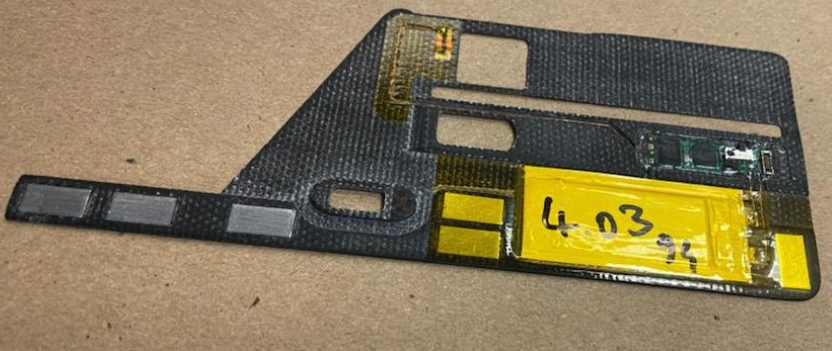
This ultra thin and flexible “deep insert” skimmer recently recovered from an NCR cash machine in New York is about half the height of a U.S. dime. The large yellow rectangle is a battery. Image: KrebsOnSecurity.com.
The insert skimmer pictured above is approximately .68 millimeters tall. This leaves more than enough space to accommodate most payment cards (~.54 mm) without interrupting the machine’s ability to grab and return the customer’s card. For comparison, this flexible skimmer is about half the height of a U.S. dime (1.35 mm).
These skimmers do not attempt to siphon chip-card data or transactions, but rather are after the cardholder data still stored in plain text on the magnetic stripe on the back of most payment cards issued to Americans.
Here’s what the other side of that insert skimmer looks like:
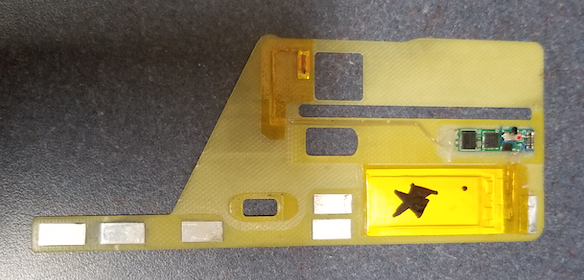
The other side of the deep insert skimmer. Image: KrebsOnSecurity.com.
The thieves who designed this skimmer were after the magnetic stripe data and the customer’s 4-digit personal identification number (PIN). With those two pieces of data, the crooks can then clone payment cards and use them to siphon money from victim accounts at other ATMs.
To steal PINs, the fraudsters in this case embedded pinhole cameras in a false panel made to fit snugly over the cash machine enclosure on one side of the PIN pad.
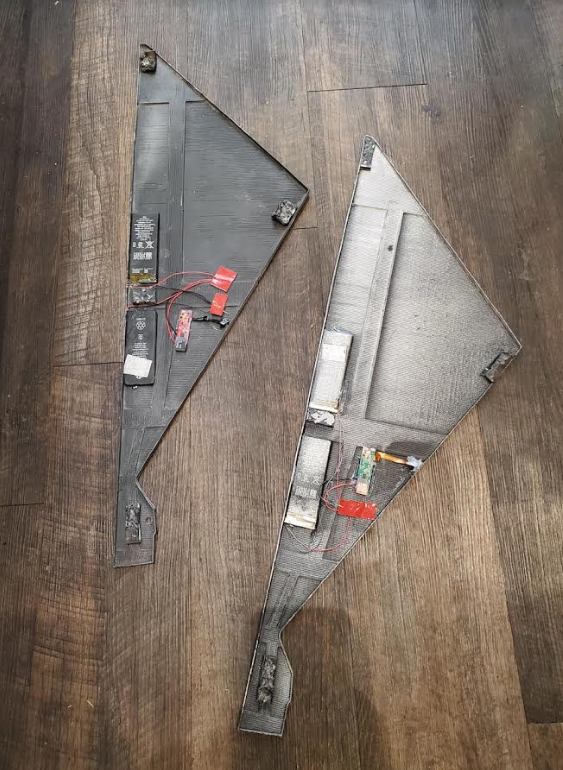
Pinhole cameras were hidden in these false side panels glued to one side of the ATM, and angled toward the PIN pad. Image: KrebsOnSecurity.com.
The skimming devices pictured above were pulled from a brand of ATMs made by NCR called the NCR SelfServ 84 Walk-Up. In January 2022, NCR produced a report on motorized deep insert skimmers, which offers a closer look at other insert skimmers found targeting this same line of ATMs.
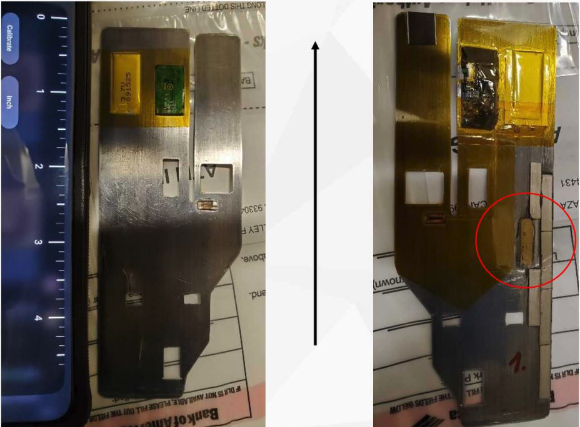
Image: NCR
Here are some variations on deep insert skimmers NCR found in recent investigations:
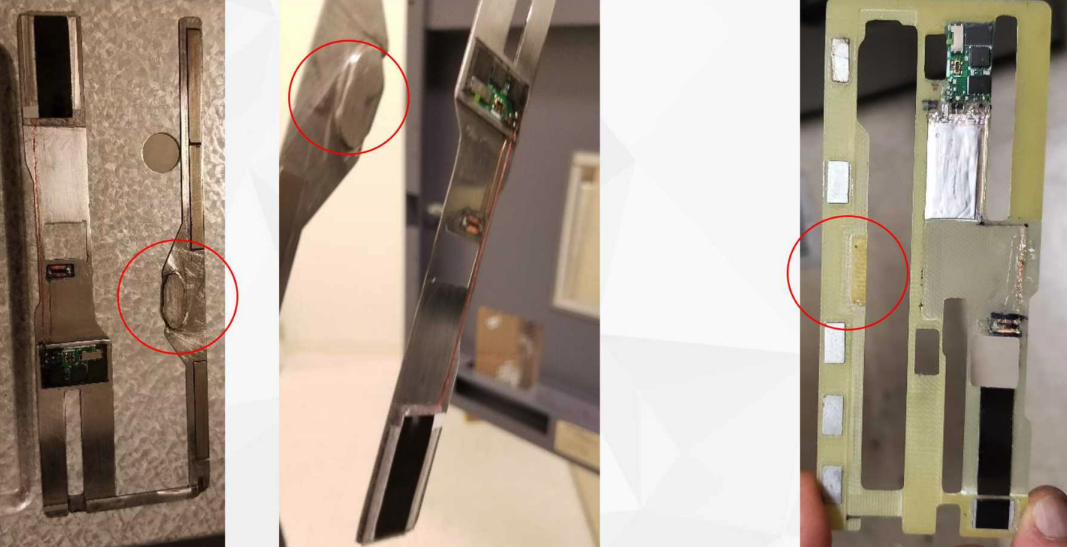
Variations on deep insert skimmers recently found inside compromised ATMs.
The image on the left below shows another deep insert skimmer and its constituent components. The picture on the right shows a battery-operated pinhole camera hidden in a false fascia directly to the right of the ATM’s PIN pad.
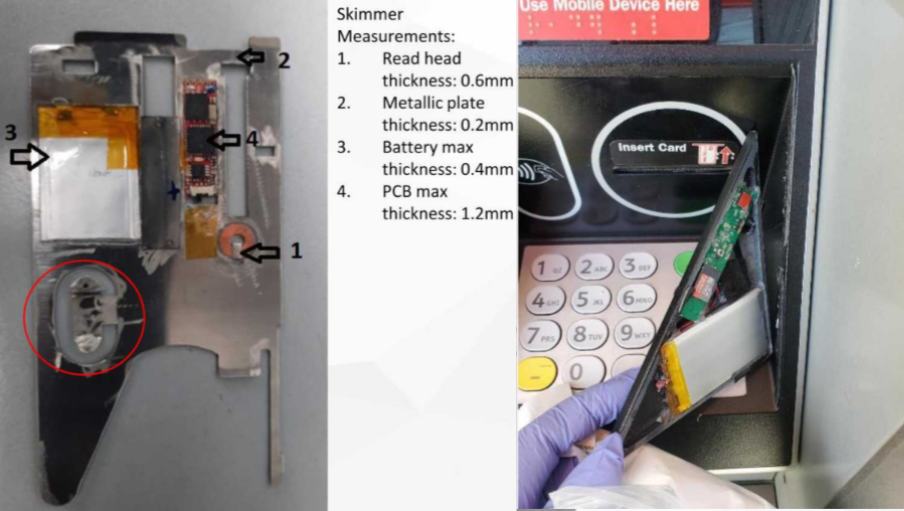
Images: NCR.
The NCR report included additional photos that show how fake ATM side panels with the hidden cameras are carefully crafted to slip over top of the real ATM side panels.

Image: NCR.
Sometimes the skimmer thieves embed their pinhole spy cameras in fake panels directly above the PIN pad, as in these recent attacks targeting a similar NCR model:
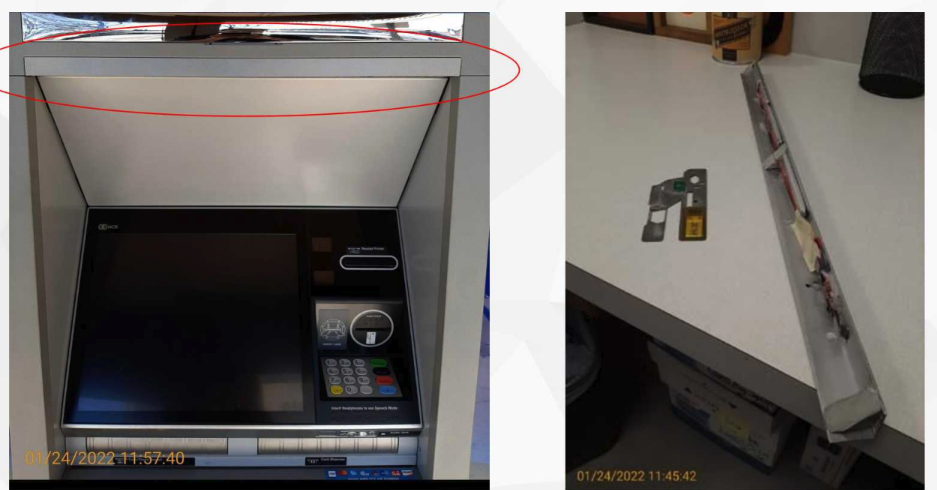
Image: NCR
In the image below, the thieves hid their pinhole camera in a “consumer awareness mirror” placed directly above an ATM retrofitted with an insert skimmer:
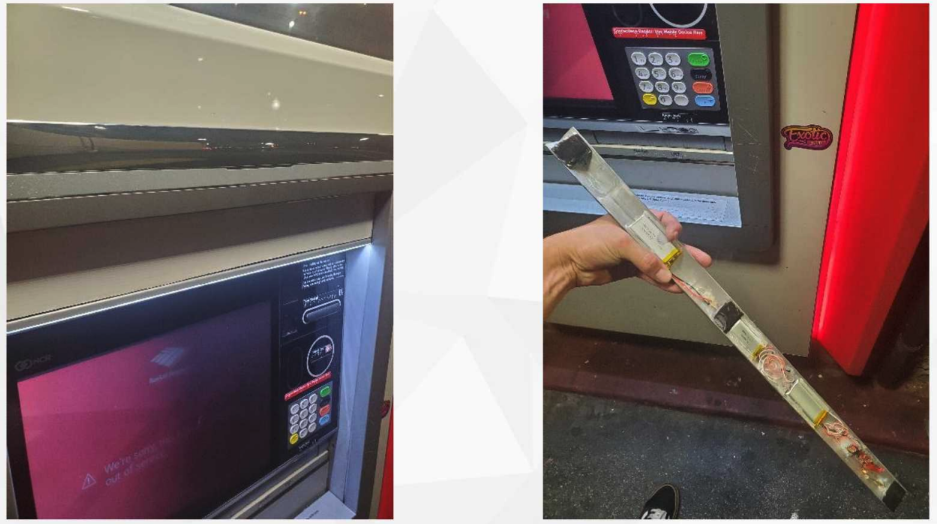
Image: NCR
The financial institution that shared the images above said it has seen success in stopping most of these insert skimmer attacks by incorporating a solution that NCR sells called an “insert kit,” which stops current skimmer designs from locating and locking into the card reader. NCR also is conducting field trials on a “smart detect kit” that adds a standard USB camera to view the internal card reader area, and uses image recognition software to identify any fraudulent device inside the reader.
Skimming devices will continue to mature in miniaturization and stealth as long as payment cards continue to hold cardholder data in plain text on a magnetic stripe. It may seem silly that we’ve spent years rolling out more tamper- and clone-proof chip-based payment cards, only to undermine this advance in the name of backwards compatibility. However, there are a great many smaller businesses in the United States that still rely on being able to swipe the customer’s card.
Many newer ATM models, including the NCR SelfServ referenced throughout this post, now include contactless capability, meaning customers no longer need to insert their ATM card anywhere: They can instead just tap their smart card against the wireless indicator to the left of the card acceptance slot (and right below the “Use Mobile Device Here” sign on the ATM).
For simple ease-of-use reasons, this contactless feature is now increasingly prevalent at drive-thru ATMs. If your payment card supports contactless technology, you will notice a wireless signal icon printed somewhere on the card — most likely on the back. ATMs with contactless capabilities also feature this same wireless icon.
Once you become aware of ATM skimmers, it’s difficult to use a cash machine without also tugging on parts of it to make sure nothing comes off. But the truth is you probably have a better chance of getting physically mugged after withdrawing cash than you do encountering a skimmer in real life.
So keep your wits about you when you’re at the ATM, and avoid dodgy-looking and standalone cash machines in low-lit areas, if possible. When possible, stick to ATMs that are physically installed at a bank. And be especially vigilant when withdrawing cash on the weekends; thieves tend to install skimming devices on Saturdays after business hours — when they know the bank won’t be open again for more than 24 hours.
Lastly but most importantly, covering the PIN pad with your hand defeats one key component of most skimmer scams: The spy camera that thieves typically hide somewhere on or near the compromised ATM to capture customers entering their PINs.
Shockingly, few people bother to take this simple, effective step. Or at least, that’s what KrebsOnSecurity found in this skimmer tale from 2012, wherein we obtained hours worth of video seized from two ATM skimming operations and saw customer after customer walk up, insert their cards and punch in their digits — all in the clear.
If you enjoyed this story, check out these related posts:
Crooks Go Deep With Deep Insert Skimmers
Dumping Data from Deep Insert Skimmers